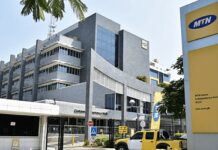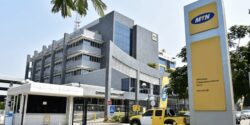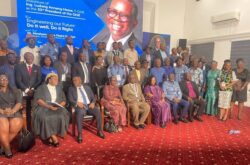By Constance GBEDZO
Ghana has bright prospects for growth in spite of persistent slowdown in growth owing to a more difficult global environment. Our dependence on natural resources had in the past supported our growth but, it had also made us vulnerable to declines in commodity prices and external shocks with strong macroeconomic downturns.
We have suffered ‘Self-Inflicted Monumental Economic Crisis’ over the past three years. Can the Ghanaian economy bounce to success? I think we can. It’s possible!!!
Ghana is lucky to be endowed with so much; our human resource; young and growing population. Ghana, and the rest of Africa have more than our fair share of the world’s natural resources. About 30percent of all known mineral resources are found in Africa; 20percent of the world’s landmass and 60percent of uncultivated arable land; 17percent of the population.
Yet we account for only about 3percent of global output, GDP, and a similar share of world trade. ….Africa has 60percent of the world’s best solar resources, but only 1percent of solar generation capacity. Ghana, with its fertile land, gold, diamond, bauxite, manganese, oil and gas, etc., is much better endowed than the average African country. The potential for development is that great.
Nonetheless, we have failed woefully to achieve the ideals of the Ghanaian 1992 Constitution; ‘a nation that is able to provide, under indigenous leadership, the basic necessities to all its people and ensure their happiness’. We have pretended for too long’. ‘Poverty in Ghana is a paradox because of our enormous resource endowments; we are hungry in the midst of plenty; thirsty, while standing in the middle of the stream; and beaten by the rain, while holding our umbrellas down.’ said Togbe Afede,
Notwithstanding all our endowments, Ghana now assumed the status of a highly indebted, bankrupt, poor country. From 35percent of GDP in 2016, our debt-to-GDP ratio balloon to over 100percent in 2022. We suffered debt sustainability with inadequate fiscal space to fund crucial and critical development needs. Ghana has actually defaulted on its debt repayment with the announcement of a Domestic Debt Exchange Programme in 2022.
Ghanaian’s once buoyant financial asset management atmosphere has been bastardized with reduction in coupon payments. Holders of Government bonds have seen the value of their investments fall. Holders of domestic bonds have been worse. We have accumulated so much debt and yet are lacking in basic socio-economic infrastructure such as roads, hospitals and/or schools.
Adding insults to injury is the galloping inflation, currency depreciation and the rising unemployment rate. Inflation has been rising since December 2021, went up to 54percent in 2022. Undeniably, there were signs of a nation in crisis everywhere you turned…’ be it ‘unsustainable indebtedness and threats of default, deteriorating socio-economic infrastructure, turmoil in the markets, and growing joblessness among our youth’.
There is therefore so much to do, yet there are no jobs. Business failures are threatening more job losses. We have failed miserably and have fallen far behind our peers in the sub-region.
Consequently, Ghanaians have endured mass suffering and growing frustration in recent times, leading mass emigration. Indeed, Ghana would have filed for bankruptcy if it were a company’.
Scholars have attributed Ghana’s chaotic economic situation to a number of factors including dishonesty; partisanship, cronyism and tribalism; greed and corruption; lack of proper planning, and economic mismanagement; and improper monetary policy that has indexed Ghana’s future to the past.
The situation is worsening by poor attitudes and beliefs. Nonetheless, the managers of the Ghanaian economy have performed poorly. Moreover, the 1992 constitution has also outlived its usefulness leading to monumental leadership failures that is lacking checks and balances in our governance structures.
We have for decades talked about the structural defects in the economy, regarding foreign domination, over-dependence on imports and our inability to add value to our exports. There have been no proper planning into the choices we make. We barely implement any viable strategies to correct defects in our economic structure.
For example; the rushed introduction of the Single Spine Salary Structure, the Free SHS Programme, One District One Factory (1D1F), the reckless construction of the National Cathedral’ and the reckless cancellation of road tolls without adequate planning and regards to the required resources. Ghana has three international airports while our internal road network remains very poor.
Also, the wasteful increase in the number of ministries and appointees in 2017, the reckless increases in the size of our parliament, payment to directors and employees of non-existent Keta Port, monies lost in the failed award of ECG to PDS, abandoned projects, sale of government vehicles and their replacement after four years or less, and expenditure on new voters registration, have been wasteful, and part of our unproductive expenditures.
Similar wasteful payment of end-of-service benefits and all manner of allowances and perks to some state employees, huge convoys, unnecessary expensive travel for mostly unproductive seminars and conferences. We are yet to account for how parliamentarians account for the various monies they are given for development interventions in their constituencies. Meanwhile, NABCO trainees are fasting and praying over unpaid allowances.
Ghana’s SOEs are poorly supervised; they build edifices they do not need, spend almost all the revenues they generate, and pay very little or no dividends to the state. Their executives travel abroad, needlessly. They have policies that provide for the payment to redundant workers as much as four (4) months’ salary for every year they have worked, even when their enterprises provide Tier 3 pension contributions.
More so, the so-called banking sector clean-up, involving the closure of some banks, was a reckless and unplanned move that imposed unnecessary cost on the state. Ghanaians have never sighted the cost-benefit analysis of that exercise.
Ghana is poor, earn so little, but spend as rich nations do. These and many more place restrictions on Ghana’s fiscal space. These, combined with corruption, results in budget shortfalls and excessive borrowing. Truly, we are still paying the price for all the recklessness.
There has been call made on the need for Ghana to diversify its economy to minimize shocks from slumps in commodity prices. We have been reminded of the need for a major policy reset in Ghana which requires policy as well as structural reforms, building of infrastructure and skills upgrade for its workforce.
We need to boost the private sector business activity in Ghana to drive the economy by putting in place enabling policies for businesses, especially small businesses and building the requisite infrastructure and environment for businesses to thrive. This cannot be done without the requisite planning, institutional capacity building and financial resources.
In the last eight years, we saw sloganeering 1D1F and digitization running parallel to each other. Digitization/digitalization, as an English word, was overused. The users forget that digitization is a means to an end. It is never an end in itself. The resultant effect is that we suffered unprecedented macroeconomic instability, high public debts, fiscal mismatch and job losses across the country. In any economic transformation agenda, digitization should help diversify the economy, enhance our national productive capacity, create the necessary jobs and alleviate poverty.
The 24-hour Economic model should provide a deliberate policy to encourage and support our enterprises and companies to operate 24/7. In Ghana, we must be able to take advantage of the pivotal role that digital technologies are playing in shaping economies through digital communication tools to help enable businesses to operate seamlessly across different time zones, providing citizens with access to goods and services at any time and in real-time. To facilitate seamless communication and transactions, many industries, especially in finance and technology, haulage & transport need to function 24/7.
For instance, the rise of digital technologies and automation has enabled businesses to operate more efficiently outside regular working hours. Online platforms, e-commerce, fintech and automated processes contribute to the continuous functioning of the economy.
This cannot be limited only ATMs or chop bar operators or night clubs as our outgoing Vice President, H.E. Dr. Mahamadu Bawumia narrowly put it.
We need to envision to create sustainable jobs for Ghanaians through the transformation of Ghana into an import substitution and export-led economy, among others. The mechanisms available to achieve this should include; modernizing and mechanizing agriculture, promoting agro-processing and manufacturing, tourism, promoting entrepreneurship, providing incentives for the private sector to thrive, thereby transforming Ghana into an import substitution and export- led economy.
We envisage that the ’24 Hour Economy’ policy as proposed by H.E. John Dramani Mahama will provide very revolutionary solution to the critical problem of high unemployment confronting Ghanaians, especially the youth, modernization, industrialization, and transformation of the Ghanaian economy for the creation of sustainable jobs, reduction in the cost of doing business, enhance productivity and give participating businesses a competitive edge to scale up production, and positively impact the SME sector, and expand the essential service economy, thereby ensure socio-economic inclusion.
We do not expect that Government to limit the sectors for the 24-hour economy. The initiative should target agriculture and agribusiness, haulage and transport, hospitality and tourism, agro-processing and manufacturing, research and education, financial services & digital start-ups and business process outsourcing, fast moving commodities and general goods and services, construction, public institutions, health & security, sanitation and waste management, etc. Government should priorities tailor-made incentives to fuel the achievement of the ideals of the ‘24 Hour Economy’ policy.
It is worth noting that SMEs form the backbone of the Ghanaian economy, and are drivers of socio- economic growth. SMEs contribute an average of 65percent of Ghana`s GDP and about 80percent of total employment in Ghana.
Enterprises have the potential to diversify our economy which is currently dependent heavily on export of few commodities. Indeed, Ghana actually needs the potential economic diversity provided by these startups and SMEs. SMEs therefore add tremendous diversity, provide import substitution, stabilize the local currency, create employment and has the potential to build resilient Ghanaian economy.
However, sustaining their growth has become a concern for many. Enterprises do not have the basic structures to sustain them. They also lack the necessary capacity to meet the rigorous financing requirements from our commercial banks.
A great number of them die early. Most enterprises, and indeed, those being formed by the youth and young women lack access to affordable finance. This lack of access to finance, constitutes a big barrier to their growth.
We need to effectively meet our enterprises with appropriate financial services, noting that access to finance is a fundamental human right, and more so for our enterprises in the remotest parts of Ghana.
Financial services provide the path to economic independence, enabling these enterprises to take advantage of emerging business opportunities to expand their existing business ventures, offer employment opportunities to the unemployed youth and providing livelihood, reducing economic hardship and poverty in our communities.
Financial services also help individuals secure their homes to paying for their children’s education. This, in the long run, also impact on banking businesses.
We need to give genuine support to private initiative and create conditions for all to participate in the development process to reduce the burden on government, enhance forex earning capacity, create jobs and reduce the national debt.
We need to de-politicize support for private sector. We need to promote great ideas and initiatives devoid of selfish or political reasons. It has become imperative to ensure enterprises are provided with the necessary capacity to become productive and competitive in the local and foreign markets.
Our vision must be to create sustainable jobs for Ghanaians through the transformation of Ghana into an import substitution and export-led economy among others. Government policy must have very revolutionary solution to the critical problem of high unemployment confronting Ghanaians, especially the youth with the objective of modernization, industrialization, and transformation of the Ghanaian economy for the creation of sustainable jobs.
Certainly, the 24 Hour Economy policy has the potential to positively impact the SME sector, expand the essential service economy thereby ensuring socio-economic inclusion, reduce the cost of doing business, enhance productivity and give participating businesses a competitive edge to scale up production in agribusiness, agro-processing/manufacturing, haulage & transport, tourism & hospitality, and research & education
Our policy makers and government need to realize that there are three (3) main structures that contribute to enterprises’ success. These are the Entrepreneur, the Enterprise and the Environment.
We expect that the necessary structures and systems will prevent business scandals, fraud, failures, mismanagement and potential civil and criminal liabilities in the enterprises. These would ensure that the reputation of the enterprises becomes more attractive to its investors, suppliers and customers and other stakeholders.
With the new wind blowing around the recent success in our general elections, going forward, government needs to make meaning of digitization, promote the 24-Hour Economic Model amongst Ghanaians, leverage globalization and the different Time Zones, ensure seamless interconnectedness of the global economy and create an enabling environment that promotes productivity.
>>>the writer is a Governance & Enterprise Development Expert
In doing this article, I read thoroughly the manuscript by Togbe Afede XIV, The Agbogbomefia of The Asogli State, Former President of the National House of Chiefs, and the Agbogbomefia Paramount Chief of Asogli State titled ‘Our Self-Inflicted Monumental Economic Crisis December 8, 2022’. I tried to paraphrase his paper to form part of this article)










